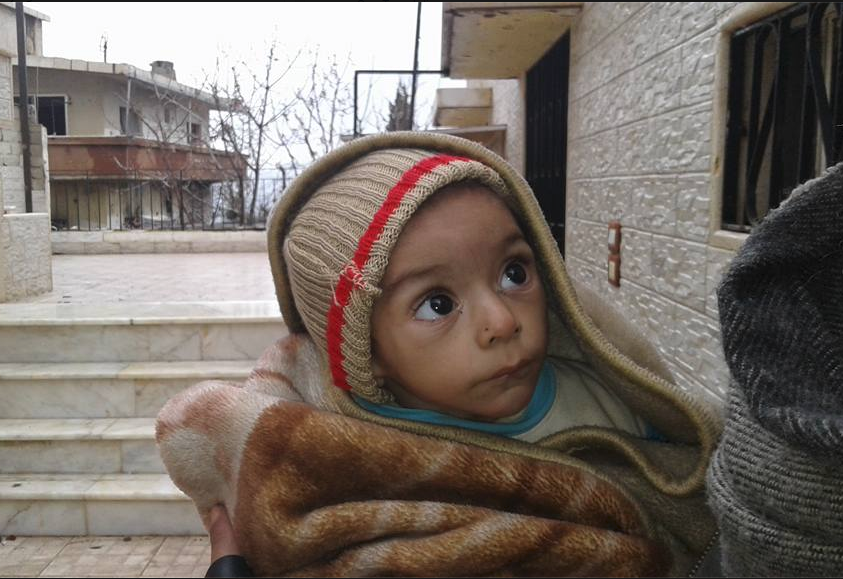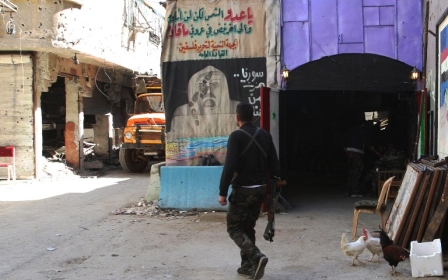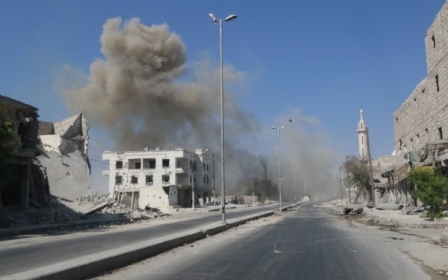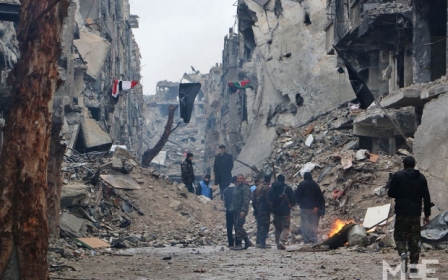Residents of besieged Syrian town beg for help as death toll mounts

The situation in the besieged Syrian town of Madaya has continued to deteriorate with residents left to starve to death or brave land mines and snipers in a bid to desperately scavenge what little food remains.
"We've forgotten what bread tastes like," 27-year-old Mohamed told AFP from the town near the Lebanese border.
"The situation has become very tragic," he said.
"Everything is gone, they have noting left at all," Raed Bourhan, a fixer for The Times who helps foreign journalists to cover the conflict, told Middle East Eye. "There is no food, no medicine, no fuel to keep them alive anymore."
"The trees have largely been cut down for firewood and there is no fuel," Bourhan, who is originally from Zabadani, said.
Winter weather has exasperated the situation further with heavy snowfall late last week covering much of the mountainous border region.
"People at least used to pick grass and herbs and eat or boil them but when the snow fell they could no longer even do this," Bourhan added.
Some 40,000 people, mostly civilians, are believed to be in the town in Damascus province near the Lebanese border, many of them displaced from the neighbouring rebel stronghold of Zabadani.
According to Bourhan, there are still hundreds of fighters mainly from Ahrar al-Sham in Zabadani, although reports vary.
The area is seen as strategically key as it is the last rebel-held part of the Lebanon-Syria border which Hezbollah now largely controls.
The two towns were encircled by government forces and Hezbollah fighters in 2014 but a six-month deal was struck last summer to allow aid in and civilians and the wounded out. In exchange, the rebels agreed to ease their hold on the two government-held towns of Fuaa and Kafraya in the Idlib province.
While the first aid delivery did happen, and some fighters and civilians evacuated, there has been no subsequent aid deliveries. There are also now reportedly grave food and aid shortages in Fuaa and Kafraya which also remain under siege and where the government has not been able to air drop supplies in recent weeks.
But Bourhan says that the Madaya siege has been exasperated by Hezbollah's tight grip on the town.
"Hezbollah were ordered to enact the siege and that is exactly what they are doing. While one might be able to bride regime soldiers to let in some supplies, Hezbollah are extremely strict," Bourhan told MEE.
According to the Britain-based Syrian Observatory for Human Rights, at least 10 people have died from lack of food and medicine in the town.
Another 13 have been killed by government mines or snipers while trying to leave in search of food, the monitoring group said.
It said that Hezbollah fighters, who are fighting alongside Syrian President Bashar al-Assad, had also placed additional mines and barbed wire around Madaya since the September deal, adding that some 1,200 people inside had chronic illnesses, and more than 300 children were suffering from malnutrition and other ailments.
But the death toll may be even higher, with Vice News reporting that 31 residents have died - either as a result of the siege or in attempting to flee.
Sources inside the town handling the negotiations said that talks are underway to get aid in within the next few days, but it remains unclear if and when the siege will be lifted.
Momina, a 32-year-old resident, told AFP by phone that she did not know if she would be able to endure much longer.
"There's nothing to eat anymore. Nothing but water has entered my mouth for two days," she said.
"One resident who was really suffering put his car on sale for the price of 10 kilos of rice. He is one of many who did that. He didn't manage to sell it, and a relative of his died as a result of the food shortages," he added.
Various sources inside the town have said that a bag of milk can go for $100, a kilo of rice for $150 and of flour for $100. Fuel is even more expensive, fetching several hundred dollars for a few liters. The average Syrian meanwhile is expected to take home no more than $200 each month.
Pawel Krzysiek, a spokesman for the International Committee of the Red Cross who entered Madaya during the last aid delivery, said that things were so bad even then that mothers could not lactate because they were so malnourished.
"There is no way to feed newborns and the young babies," he said in a statement.
Krzysiek said the ICRC and Syria's Red Crescent were hoping to be able to bring aid into Madaya "as soon as possible".
"It's not a solution to do one-off, one-shot food deliveries," he said.
"In places like that, that have been left without aid for months, even years, you really need to deliver regularly to makes sure that people have enough food to feed themselves and their families."
Bourhan said the only lasting solution "to the Madaya catastrophe" was to put pressure on governments and the UN Security Council to unite and act immediately.
New MEE newsletter: Jerusalem Dispatch
Sign up to get the latest insights and analysis on Israel-Palestine, alongside Turkey Unpacked and other MEE newsletters
Middle East Eye delivers independent and unrivalled coverage and analysis of the Middle East, North Africa and beyond. To learn more about republishing this content and the associated fees, please fill out this form. More about MEE can be found here.




